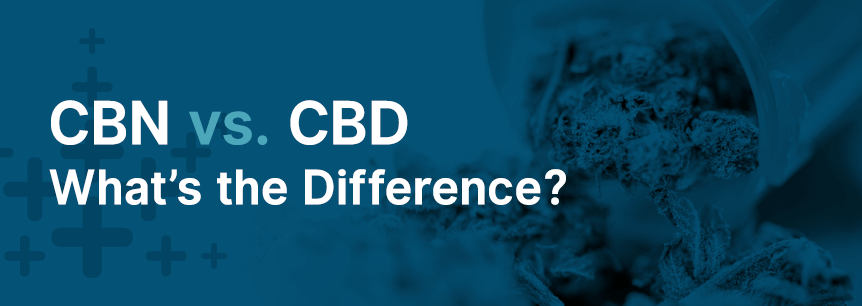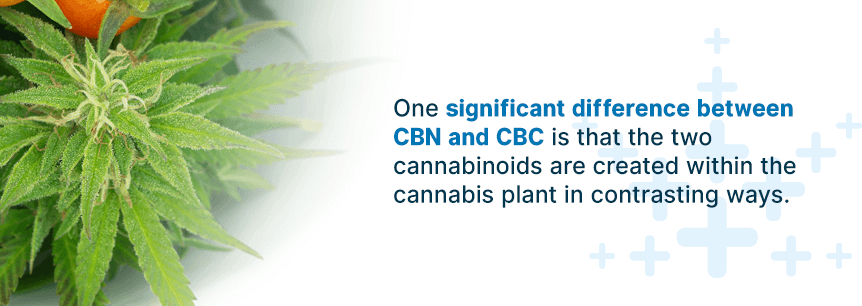
As more patients turn to cannabis to treat their necessary health conditions, it becomes much more pressing to answer a wide range of questions surrounding medical marijuana products and strains, cannabis intake methods and production methods.
Today, consumers want to be as educated on this therapeutic substance as possible before forming the ideal treatment plan for their needs. One rising curiosity patients want to learn more about is the various cannabis components available for medical treatment — which leads us to the topic of CBN vs. CBD. But what is the difference between cannabinol (CBN) and cannabidiol (CBD)?
Before we delve into the similarities and differences between CBD and CBN, you’ll first want to understand what these two cannabis components are to avoid any confusion.
CBD and CBN are both cannabinoids. What does this mean? Cannabinoids are chemical compounds found in the marijuana plant. These compounds help regulate the endocannabinoid system and ensure the body has an easier time achieving a state of homeostasis, or stability. While this may seem like a bunch of medical talk, the most crucial takeaway to remember is that cannabinoids are primarily responsible for producing the myriad of health benefits cannabis currently boasts.
The various cannabinoids found in marijuana interact with receptors scattered throughout the body — albeit in varying ways. While one receptor may impact the central nervous system, another may be responsible for promoting a healthy sleep cycle. We already know about more than a dozen different compounds, or cannabinoids, found in the cannabis plant, and many more we don’t know about yet most likely exist. In this article, we’ll be focusing solely on CBN and CBD.
If you’ve ever dabbled in a marijuana treatment plan, you may have heard about CBD before. But what exactly is cannabidiol, and what should you know about this cannabinoid before seeking products composed of CBD? Let’s take a closer look below.
Have you heard of CBD before? If so, there’s a reason. CBD is one of the most common cannabinoids patients and recreational users can both benefit from. It’s also widely esteemed for its non-psychoactive properties. Unlike THC, which is responsible for the “high” that individuals feel when using cannabis, CBD helps treat a myriad of unwanted symptoms without inducing a psychoactive effect in the process.
Due to its non-psychoactive yet therapeutic properties, CBD is the ideal option for patients with health conditions or complications that require symptom relief without any mental effects.
Although cannabinol (CBN) was one of the first cannabinoids discovered in cannabis, it’s not as widespread as CBD is today. This relaxation-inducing and anti-bacterial compound is an oxidized version of THC.
A marijuana strain must go through multiple stages of development before it can contain cannabinol. In fact, many avid cannabis-users claim that older marijuana is more likely to contain high traces of CBN. But why?
The cannabinoids in marijuana must undergo a process of decay before they mature into CBN. For this reason, cannabinol isn’t as widely available as other cannabinoids since it takes some time to form.
While this substance is touted for its sedative effects, it isn’t known to produce an intoxicating or psychoactive effect like THC. This means CBN is an excellent choice for patients who require symptom-relief without any altered mental side effects. One of the best uses of CBN is as a sleep aid for those with insomnia or irregular sleep patterns.
At first glance, CBN and CBD are both similar in many different ways. They’re both cannabinoids found in cannabis that interact with neurons in a patient’s brain to help regulate the endocannabinoid system.
If you’re researching cannabis and want to know which strains can bring you symptom relief without the “high” feeling associated with THC, you’re in luck. Both CBN and CBD are known for their ability to alleviate unwanted symptoms without altering a patient’s sense of mental clarity in the process.
Both of these cannabinoids are often used to treat similar symptoms, too. They interact with receptors in the brain to help stabilize the endocannabinoid system, producing a myriad of beneficial side effects in the process.

One significant difference between CBN and CBC is that the two cannabinoids are created within the cannabis plant in contrasting ways. As noted above, CBN requires a more extensive aging process to form. Since varying cannabinoids interact with the brain in differing ways, you can use them to treat different medical conditions, too.
In the debate between cannabidiol and cannabinol, you may be wondering, “Which is the best option?” But to answer the question of which cannabinoid is ideally suited for a patient, an individual will need to outline their needs and desired symptom-treatment plan before choosing one or the other.
CBD works excellently as a medication for patients with multiple sclerosis, epilepsy and muscle spasms. Due to cannabidiol’s positive interaction in the nervous system, it’s the ideal treatment for those with convulsion symptoms — namely, those with epilepsy. This trusted cannabinoid is also suitable for patients following a stroke or head trauma since CBD can successfully reduce neurotoxic brain damage.
However, CBD is much more notoriously known for its calming and sleep regulation properties because it’s an oxidized version of THC with only a minor degree of psychoactive properties.
Ultimately, neither CBN or CBD beats the other regarding effectiveness or performance. When it comes down to it, choosing between CBN and CBD is merely a matter of preference, and your choice will vary depending on your symptoms.
However, since CBD is more widely studied and easier to access, you may want to consider choosing a CBD product to treat your symptoms first. If you don’t experience the relief you desire with CBD, consider seeking out CBN as a secondary option instead.
Want to learn more about how you can benefit from marijuana while discovering the cannabis resources that will help make you a more informed patient? We invite you to read more about the latest information surrounding the cannabis industry by visiting our blog today.
No Information on MarijuanaDoctors.Com should be used to diagnose, treat, prevent or cure any disease or condition. You can view our Full Disclaimer here.